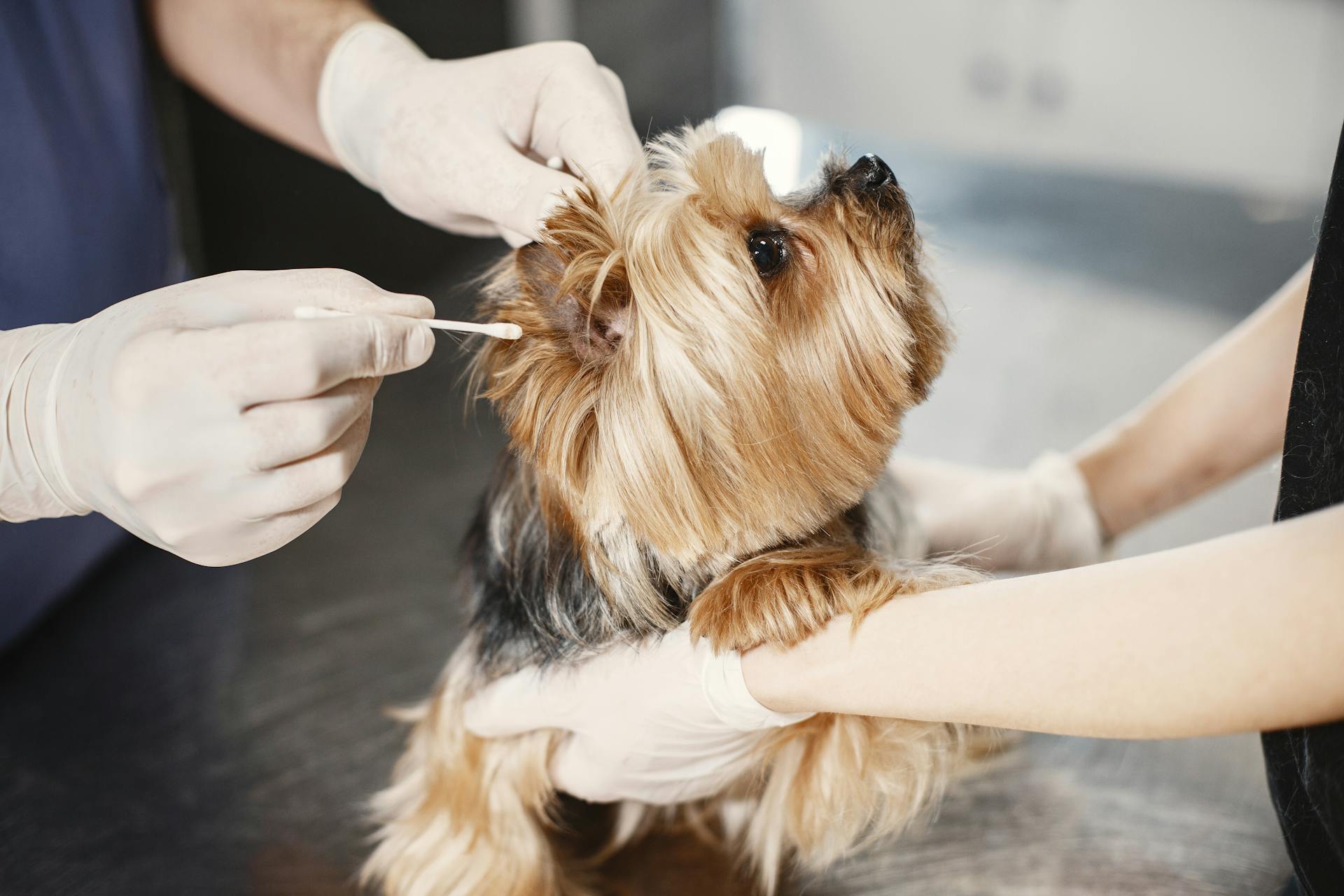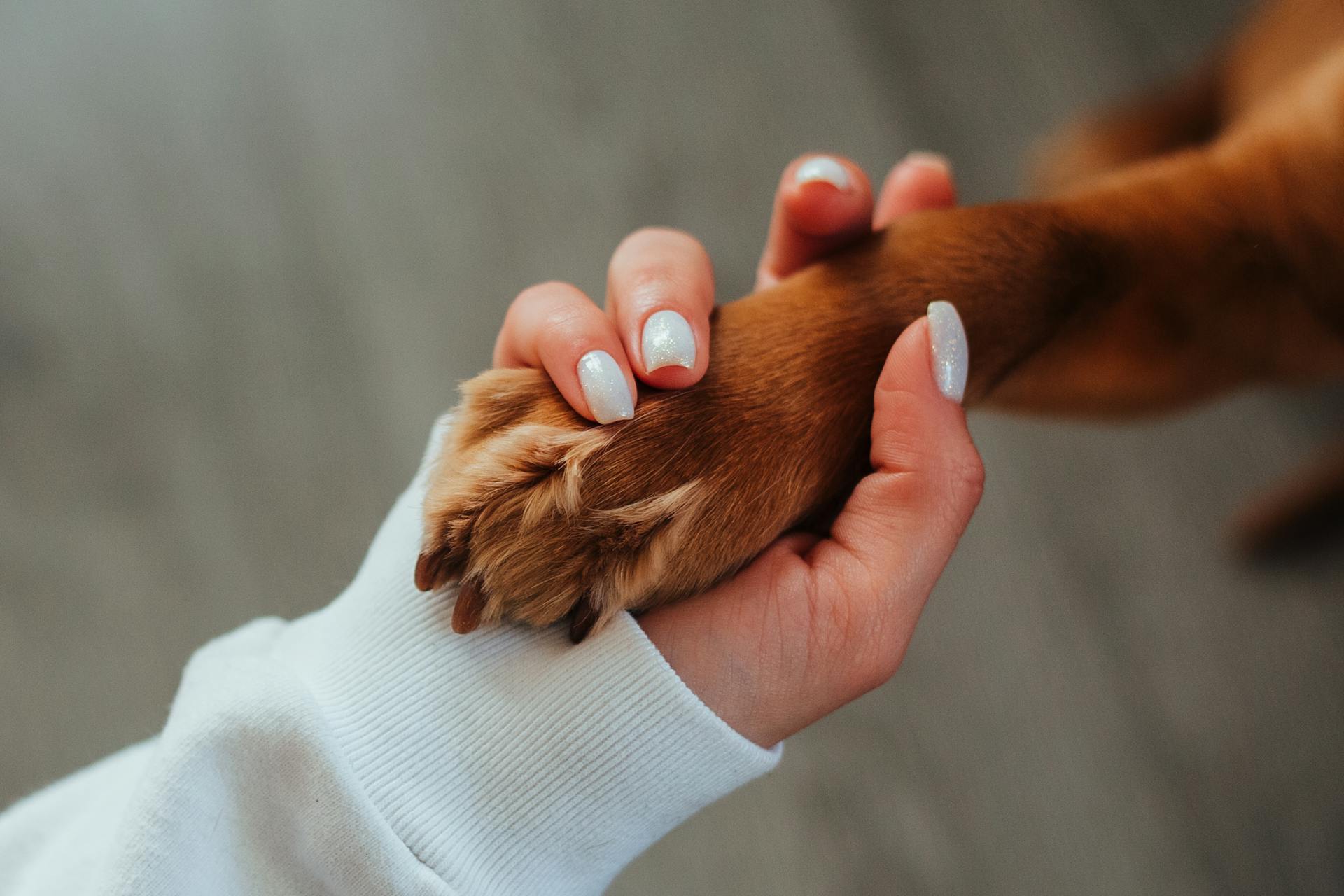
Toy Poodles are known to be prone to a range of health issues, including eye problems and patellar luxation.
One of the most common eye issues in Toy Poodles is progressive retinal atrophy, which can lead to blindness.
Their small size makes them susceptible to patellar luxation, a condition where the kneecap slips out of place.
Toy Poodles can also be prone to dental issues, such as tooth decay and gum disease, due to their small jaw size and crowded teeth.
Additional reading: Do Toy Poodles Stay Small
Health Problems
Dental disease is a common chronic problem in Toy Poodles, affecting 80% of them by age two. Regular dental cleaning can help prevent tartar build-up and gum infection, which can lead to tooth loss and damage to organs like the kidneys, liver, heart, and joints.
Toy Poodles are also prone to ear infections, which can be caused by an overgrowth of yeast and/or bacteria in the ear. Symptoms include visible debris, redness, odor, head shaking, and scratching. Trimming the hair from the ear may help reduce the incidence of ear infections.
On a similar theme: Dental Health Diets for Dogs
Epilepsy is another health issue that affects Toy Poodles, with three types of seizures: reactive, secondary, and primary. If your dog has a seizure, carefully prevent him from injuring himself, but don't try to control his mouth or tongue. Lifelong medication may be necessary to keep seizures under control.
- Change in appetite or water consumption
- Tartar build-up, bad breath, red gums, or broken teeth
- Itchy skin (scratching, chewing, or licking), hair loss
- Lethargy, mental dullness, or excessive sleeping
- Fearfulness, aggression, or other behavioral changes
Dental
Dental problems are a common issue for dogs, especially small breeds like Toy Poodles.
80% of all dogs are affected by dental disease by the age of two, and Toy Poodles are more likely to have problems with their teeth.
Tartar build-up on the teeth can lead to infection of the gums and roots of the teeth.
Regular dental cleanings are essential to prevent or treat dental disease, which can cause your dog to lose teeth and even shorten their lifespan by one to three years.
Daily tooth brushing with a dog-specific toothpaste is a simple and effective way to prevent dental disease, and can be done at home.
Here's an interesting read: How to Prevent Diabetes in Dogs
Bleeding Disorders
Bleeding Disorders in Toy Poodles can be a serious issue, and it's essential to be aware of the potential risks. Toy Poodles are particularly prone to some rare bleeding disorders.
Hemolytic Anemia and Thrombocytopenia is a condition where the immune system attacks the pet's own red blood cells or platelets, leading to anemia, weakness, and lethargy. If the immune system destroys platelets, the blood won't clot properly, and your dog may have bruises or abnormal bleeding.
Diagnostic testing for blood clotting is crucial before performing any surgeries. We'll perform diagnostic testing for blood clotting to check for these problems before we perform any surgeries. To slow or stop the immune system's destruction of cells, we'll prescribe steroids and other immune-suppressive drugs. Sometimes an emergency transfusion of red blood cells or platelets is needed.
Von Willebrand's disease is a blood clotting disorder frequently found in Toy Poodles. We'll conduct diagnostic testing for blood clotting time or a specific DNA blood test for Von Willebrand's disease or other similar disorders to check for this problem before we perform surgery.
Consider reading: Dog Digestive System Diagram

If you suspect your Toy Poodle is experiencing any of these symptoms, it's essential to seek veterinary help immediately. The symptoms of bleeding disorders can be subtle, but they can quickly escalate into life-threatening situations.
Here are some common symptoms of bleeding disorders in Toy Poodles:
- Anemia, weakness, and lethargy
- Bruises or abnormal bleeding
- Whitish or yellow gums instead of the normal bright pink color
- Blood won't clot properly
- Emergency transfusion of red blood cells or platelets may be needed
Keep in mind that some Toy Poodles may not show any symptoms until a serious injury occurs or surgery is performed. If you're planning to have your Toy Poodle spayed, neutered, or have any other surgery, it's crucial to check for bleeding disorders beforehand.
Discover more: English Bulldog Soft Palate Surgery
Epilepsy
Epilepsy is a serious health problem that affects dogs, and it's essential to understand the different types of seizures that can occur.
Reactive seizures are caused by the brain's reaction to a metabolic problem like low blood sugar, organ failure, or a toxin. Secondary seizures are the result of a brain tumor, stroke, or trauma.
If your dog is prone to seizures, they will usually begin between six months and three years of age. This is often an inherited condition, with Toy Poodles commonly afflicted.
Lifelong medication is usually necessary to help keep seizures under control, with periodic blood testing required to monitor side effects and effectiveness. If your dog has a seizure, carefully prevent him from injuring himself, but don't try to control his mouth or tongue.
Note the length of the seizure, and call a veterinarian or an emergency hospital for advice and assistance.
Patellar Luxation
Patellar Luxation is a common health issue in dogs where the patella, or kneecap, moves out of its normal groove in the femur.
This movement can cause discomfort and may lead to arthritis over time.
Many dogs with patellar luxation will skip or run on three legs due to the discomfort.
Some cases of patellar luxation will correct themselves, but in more severe cases the patella remains out of place.
In mild cases, joint supplements like fish oils and glucosamine can be used to control pain and prevent arthritis.
Surgery may be recommended for dogs with more severe patellar luxation.
Heart and Circulatory Issues
Toy Poodles are especially prone to heart disease, which is a leading cause of death in their golden years.
Heart failure is often caused by weakening of a valve, leading to blood leaking back into the heart and straining it.
A heart murmur is a common sign of heart valve disease, which can be diagnosed through regular check-ups with your veterinarian.
Poodles are also susceptible to a condition called Patent Ductus Arteriosis, in which a small vessel in the heart doesn't close properly, leading to fluid build-up and strain on the heart.
If your Toy Poodle has this condition, your veterinarian may recommend surgery to close the problematic vessel.
Regular check-ups are crucial in monitoring heart health, with tests like ECGs and echocardiograms recommended starting at age one.
Early detection of heart disease can make a big difference, and with medication and dietary changes, Toy Poodles can live longer, healthier lives.
Expand your knowledge: Can Dogs Sense a Heart Attack
Eye and Ear Issues
As a Toy Poodle owner, it's essential to be aware of the potential eye and ear issues that can affect your furry friend. Toy Poodles are prone to eye problems, including glaucoma, which is an extremely painful disease that rapidly leads to blindness if left untreated. Squinting, watery eyes, bluing of the cornea, and redness in the whites of the eyes are common symptoms.
Related reading: Shar Pei Dog Eye Problems
Glaucoma is a medical emergency, and if you notice any of these symptoms, don't wait to call your veterinarian - go to an emergency clinic right away. Regular eye exams can help diagnose and treat eye conditions early on, so make sure to schedule annual check-ups with your vet.
In addition to eye problems, Toy Poodles are also more likely to develop ear infections, which can be caused by an overgrowth of yeast and/or bacteria in the ear. Visible debris, redness, odor, head shaking, and scratching are common symptoms of ear infections, and regular ear cleanings and trims can help prevent them.
Explore further: Pomeranian Dog Eye Problems
Eye
Eye problems can have a dramatic impact on your dog's quality of life, especially for Toy Poodles. Unfortunately, they can inherit or develop a number of different eye conditions that may cause blindness if not treated right away.
Glaucoma is an extremely painful disease that rapidly leads to blindness if left untreated. Symptoms include squinting, watery eyes, bluing of the cornea, and redness in the whites of the eyes.
Broaden your view: Eye Problems Cocker Spaniels
Cataracts are a common cause of blindness in older Poodles, causing the lenses of their eyes to become more opaque and cloudy. Many dogs adjust well to losing their vision and get along just fine.
Distichiasis is a painful condition caused by extra hairs that grow inside of the eyelid and rub on the surface of the eye. This is one of the most commonly inherited diseases in dogs, and Toy Poodles are more likely than other dogs to develop it.
Regular eye exams are crucial to catch eye problems early on. Your veterinarian will evaluate your Poodle's eyes at every examination to look for any signs of concern.
Daily eye care can also help prevent eye problems. Wiping your Poodle's eyes daily with a soft, moist cloth will help remove debris, and rinsing the corners of the eyes daily with saline can help prevent tear staining.
Hair around your Toy Poodle's eye should be carefully trimmed to keep it from causing any irritation. If squinting or eye discharge is noted, take a trip to the veterinarian for an exam, as these can be signs of more serious eye conditions.
Expand your knowledge: How to Prevent Twisted Stomach in Dogs
Ear
Ear infections are a common issue in Toy Poodles, caused by an overgrowth of yeast and/or bacteria that naturally lives within the ear. Symptoms include visible debris, redness, odor, head shaking, and scratching.
Toy Poodles develop ear infections more often than most other breeds. This may be partly due to Poodles having long ear canals with excess curly hair to trap in moisture and debris.
Cleaning your dog's ears every week or two can help prevent ear infections. Trimming the ear hair, not plucking it, may also reduce the incidence of ear infections.
Dogs with chronic or recurring ear infections often have allergies that should be addressed. Regular ear cleaning and trimming can help prevent ear infections in Toy Poodles.
Curious to learn more? Check out: How to Cut a Toy Poodles Hair
Skin and Coat Issues
Toy poodles are prone to a variety of skin problems, including one called sebaceous adenitis. This condition can cause dry, scaly skin with patches of hair loss along the top of their head, back of their neck, and back.
Additional reading: Weiner Dog Back Brace
You may first notice this issue when your toy poodle is between one and five years of age. The response to treatment is highly variable, but giving fatty acid supplements and using special shampoos to remove dead skin and hair is almost always necessary.
The earlier you check out your toy poodle's skin, the better their results will be. Treatment for sebaceous adenitis is generally long term, and a combination of approaches may be needed to find what works best for your dog.
Parasites
Parasites can invade your Poodle's body, inside and out, causing pain, discomfort, and even death.
Fleas, ticks, and ear mites can infest your Poodle's skin and ears. Hookworms, roundworms, heartworms, and whipworms can get into her system in a number of ways, including drinking unclean water or walking on contaminated soil.
Some of these parasites can be transmitted to you or a family member and are a serious concern for everyone. These parasites can cause a range of problems, from mild discomfort to life-threatening conditions.
It's essential to test for parasites on a regular basis to prevent and detect infestations. We'll recommend preventive medication as necessary to keep your Poodle healthy.
Skin Conditions
Poodles are prone to a variety of skin problems, including one called sebaceous adenitis. This condition causes dry, scaly skin with patches of hair loss along the top of the head, back of the neck, and back.
You may first notice the symptoms when your dog is between one and five years of age. The earlier the skin is checked out, the better his results.
Treatment for sebaceous adenitis is generally long term, and a combination of approaches may be needed to determine what is most effective for your dog. This can involve a range of methods.
You'll almost always need to give fatty acid supplements to help your dog's skin and hair. Special shampoos are also essential for removing dead skin and hair.
The response to treatment is highly variable, but with the right approach, your dog's symptoms can be managed.
For more insights, see: American Bully Back Leg Problems
Nutrition and Diet
Nutrition and Diet is a crucial aspect of maintaining a healthy Toy Poodle. Toy Poodles may benefit from omega-3 fatty acids added to their diets, which can be found in skin and joint supplements, fish oil, and some specially formulated dog foods.
These fatty acids act as natural anti-inflammatories that help support the skin, coat, kidneys, joints, and heart. It's essential to feed a high-quality diet appropriate for your Toy Poodle's age, and to keep their diet consistent to avoid overfeeding.
Obesity is a significant health problem in Toy Poodles, causing or worsening joint problems, metabolic and digestive disorders, back pain, and heart disease. Roundworm eggs can also be a concern, so it's crucial to keep your dog's diet consistent and not give them people food.
A well-balanced diet is key to maintaining a healthy Toy Poodle. Here are some essential tips to keep in mind:
- Feed a commercial kibble or wet food approved by the Association of American Feed Control Officials (AAFCO).
- Puppies should be fed a diet formulated specifically for puppies or designated for all life stages.
- Adult Toy Poodles may benefit from dental-focused diets to prevent dental disease.
Obesity
Obesity can be a significant health problem in Toy Poodles, causing or worsening joint problems, metabolic and digestive disorders, back pain, and heart disease.
It's tempting to give your pal food when she looks at you with those soulful eyes, but this can lead to obesity. You can "love her to death" with leftover people food and doggie treats.

Giving your Toy Poodle a hug, brushing her fur or teeth, playing a game with her, or taking her for a walk can make her feel better, and so will you.
Obesity is a serious disease that may cause or worsen joint problems, metabolic and digestive disorders, back pain, and heart disease in Toy Poodles.
Diet and Exercise
Diet is a crucial aspect of a Toy Poodle's overall health. A high-quality diet appropriate for her age is essential to ensure she receives all the necessary nutrients. Feed a commercial kibble or wet food approved by the Association of American Feed Control Officials (AAFCO) to guarantee a complete and balanced diet.
Toy Poodles often have serious problems with their teeth, so brushing them at least three times a week is a must. Don't forget to clean her ears weekly, even as a puppy, to prevent infections. Adding omega-3 fatty acids (DHA/EPA) to their diets can be beneficial, especially for skin and joint health.
A consistent diet is key to maintaining your Toy Poodle's health. Avoid giving her people food, as it can lead to obesity and other health issues. Instead, give her a hug, brush her fur or teeth, play a game with her, or take her for a walk to show your love and care.
Here are some dietary recommendations for Toy Poodles:
- Puppies: Feed a diet formulated specifically for puppies or designated for all life stages.
- Adults: Dental-focused diets may be recommended by your veterinarian to help prevent dental disease.
Regular exercise is also vital for a Toy Poodle's overall health. However, don't overdo it at first, as they can be prone to joint problems. Daily walks and short play sessions are perfect for keeping your Toy Poodle happy and healthy.
Spay or Neuter
Spaying or neutering your Poodle can be a great way to prevent certain types of cancers. This surgery is a relatively simple procedure that can be done while your pet is under anesthesia, allowing us to identify and address potential health issues.
Spaying or neutering decreases the likelihood of certain types of cancers and eliminates the possibility of your pet becoming pregnant or fathering unwanted puppies. This is especially important for Poodles, as they can be prone to certain health issues.
Check this out: Preventative Care Keeping Your Pet Healthy Year-Round
Performing this surgery gives us a chance to identify and address some of the diseases your dog is likely to develop. For example, if your pet needs hip X-rays or a puppy tooth extracted, this would be a good time.
Routine blood testing prior to surgery also helps us to identify and take precautions for common problems that increase anesthetic or surgical risk. This is a simple and painless process that can give us valuable information about your pet's health.
Care and Maintenance
Regular veterinary check-ups are essential for maintaining your toy poodle's health. These check-ups will help identify potential health issues early on.
Watching your toy poodle's diet is crucial for her overall health. This includes making sure she gets plenty of exercise and regularly brushing her teeth and coat.
Call a pet emergency hospital or your veterinarian if you notice anything unusual with your toy poodle. This could be a sign of a more serious health issue.
Adhering to the recommended schedule of examinations and vaccinations will help prevent diseases and conditions common in Poodles. This is when your veterinarian will give your toy poodle the necessary "check-ups" and test for diseases.
Signing up for pet health insurance is a very important step in caring for your toy poodle. This will help cover the costs of medical tests and procedures she may need throughout her life.
For more insights, see: Papillon Dog Health Problems
General Information
Brushing your dog's teeth daily will prevent periodontal disease. This is a crucial habit to get into, especially for toy poodles.
Proper dental care can make a big difference in your toy poodle's overall health. Brushing their teeth daily will help prevent periodontal disease.
Toy poodles need regular exercise to stay healthy and happy. Aim for at least one walk or playtime session every day.
Daily brushing of your toy poodle's teeth will prevent periodontal disease. It's a simple habit to get into, but it's essential for their health.
Emergencies and Return
If you notice any of the following signs in your toy poodle, seek medical care immediately.
Scratching or shaking the head, tender ears, or ear discharge can be a sign of an underlying issue.
Inability or straining to urinate; discolored urine may indicate a urinary tract problem.
Cloudiness, redness, itching, or any other abnormality involving the eyes requires prompt attention.
Coughing, especially at night or upon rising after sleeping, rapid breathing at rest can be a sign of respiratory distress.
Drinks and urinates more, eats more, potbelly, poor haircoat can be indicative of an underlying health issue.
Increased hunger and thirst, weight loss may be a sign of diabetes or other metabolic disorders.
Gums that are a color other than bright pink can be a sign of an underlying health issue.
Any abnormal shaking, trembling, or excessive involuntary tremors require immediate veterinary attention.
Leg stiffness, reluctance to rise, sit, use stairs, run, jump, or "bunny hopping" can be a sign of intervertebral disc disease (IVDD).
You might like: Why Is My Maltipoo Shaking
Emergencies

If you notice any of the following signs in your pet, seek medical care immediately. Scratching or shaking the head, tender ears, or ear discharge can be a sign of an underlying health issue.
Tender ears or ear discharge can be painful for your pet, and if left untreated, can lead to more serious problems. Inability or straining to urinate, or discolored urine, are also signs that require immediate attention.
Cloudiness, redness, itching, or any other abnormality involving the eyes can be a sign of an eye infection. Coughing, especially at night or upon rising after sleeping, rapid breathing at rest, can be a sign of respiratory issues.
Drinking and urinating more, eating more, and developing a potbelly can be signs of diabetes or other health issues. Increased hunger and thirst, weight loss, can also be signs of underlying health problems.
Gums that are a color other than bright pink can be a sign of dental issues. Any abnormal shaking, trembling, or excessive involuntary tremors can be a sign of neurological problems.
Leg stiffness, reluctance to rise, sit, use stairs, run, or "bunny hopping" can be signs of arthritis or other mobility issues.
If this caught your attention, see: Pit Bulls Ears
Return

If you're returning home after a vet visit, it's essential to keep an eye out for any signs of distress in your pet.
Autoimmune thyroid disease can manifest in various ways, including changes in appetite, weight, and energy levels.
Returning home after a vet visit is a great opportunity to monitor your pet's behavior and watch for any potential health issues.
Patent ductus arteriosis can cause symptoms such as coughing, difficulty breathing, and lethargy.
Make sure to provide a safe and comfortable environment for your pet to recover in.
Tetralogy of Fallot can lead to blue discoloration of the skin and mucous membranes, which is a medical emergency.
Keep a close eye on your pet's overall health and well-being, and don't hesitate to contact your vet if you notice anything unusual.
Von Willebrand’s disease can cause excessive bleeding and bruising, so it's crucial to monitor your pet's wounds and report any concerns to your vet.
Here's an interesting read: Dog Hemorrhagic Gastroenteritis Home Treatment

Regular check-ins with your vet can help prevent and manage these conditions.
Distichiasis can cause eye irritation and discharge, so be sure to keep an eye on your pet's eye health.
Providing a nutritious diet and regular exercise can also help maintain your pet's overall health.
Portosystemic shunt can lead to vomiting, diarrhea, and lethargy, so it's essential to monitor your pet's digestive health.
If you notice any of these symptoms, don't hesitate to reach out to your vet for guidance and support.
Legg-Perthes disease can cause pain and stiffness in your pet's joints, so be sure to monitor their mobility and report any concerns.
Early detection and treatment are key to managing these conditions.
Congenital deafness can cause behavioral changes, such as increased sensitivity to noise, so it's essential to be aware of your pet's auditory limitations.
Providing a safe and comfortable environment can help alleviate any stress or anxiety your pet may be experiencing.
Check this out: Why Do Yorkshire Terriers Lick so Much
Key Considerations
As you care for your Toy Poodle, it's essential to be aware of the signs that indicate a potential health issue. A change in appetite or water consumption can be a clear signal that your dog needs veterinary help.
You should pay close attention to your Toy Poodle's oral health, as tartar build-up, bad breath, red gums, or broken teeth can be a sign of a more serious problem.
Itchy skin, characterized by scratching, chewing, or licking, can be a sign of allergies or skin infections. Hair loss can also be a symptom of underlying health issues.
Lethargy, mental dullness, or excessive sleeping can be indicative of a variety of health problems, including infections or neurological issues. These symptoms should not be ignored, as they can be a sign of a serious disease.
Fearfulness, aggression, or other behavioral changes can be a sign that your Toy Poodle is experiencing pain or discomfort. These changes can also be a sign of underlying medical conditions.
Here are some common signs of potential health issues in Toy Poodles:
Frequently Asked Questions
What is the leading cause of death in toy poodles?
Heart failure is a leading cause of death in Toy Poodles, often caused by weakened heart valves that allow blood to leak back into the heart. Learn more about heart health in Toy Poodles and how to identify the signs of heart failure.
What is the life expectancy of a toy poodle?
The average life expectancy of a Toy Poodle is 18-19 years. However, individual lifespan can vary based on factors like nutrition, genetics, and health.
What are the downsides of toy poodles?
Toy poodles can be prone to several health issues, including skin problems, urinary issues, breathing difficulties, and eye problems. If you're considering bringing a toy poodle into your family, it's essential to be aware of these potential downsides.
Sources
- https://progress-park-veterinary-hospital.com/client-resources/breed-info/toy-poodle/
- https://www.thepethealthclinic.com/client-resources/breed-info/toy-poodle/
- https://healthypawsvetclinic.com/breed-info-species/canine/toy-poodle/
- https://cypresswoodanimalclinic.com/client-resources/breed-info/toy-poodle/
- https://www.petmd.com/dog/breeds/toy-poodle
Featured Images: pexels.com


